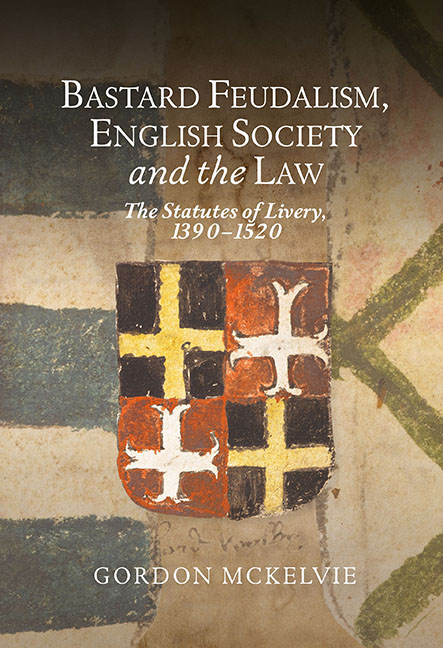Book contents
- Frontmatter
- Contents
- Acknowledgements
- Abbreviations
- Timeline of Parliamentary Activity
- Introduction
- Chapter 1 The System – Liveries and Retaining
- Chapter 2 The Early Years, 1390 to 1449
- Chapter 3 The Later Years, 1449 to 1520
- Chapter 4 Outcomes and Enforcement
- Chapter 5 The Identity of the Indicted
- Chapter 6 The Geography of the Cases
- Chapter 7 Networks and Localities
- Chapter 8 Livery and Disorder
- Chapter 9 The Urban Experience
- Conclusion
- Appendix 1 Number of Cases by Reign
- Appendix 2 Number of Cases in each County
- Appendix 3 List of Letters to Towns and Lordships
- Appendix 4 List of Local Ordinances
- Appendix 5 Letters from Henry VII to Duchy of Lancaster Officials
- Bibliography
- Index
- Frontmatter
- Contents
- Acknowledgements
- Abbreviations
- Timeline of Parliamentary Activity
- Introduction
- Chapter 1 The System – Liveries and Retaining
- Chapter 2 The Early Years, 1390 to 1449
- Chapter 3 The Later Years, 1449 to 1520
- Chapter 4 Outcomes and Enforcement
- Chapter 5 The Identity of the Indicted
- Chapter 6 The Geography of the Cases
- Chapter 7 Networks and Localities
- Chapter 8 Livery and Disorder
- Chapter 9 The Urban Experience
- Conclusion
- Appendix 1 Number of Cases by Reign
- Appendix 2 Number of Cases in each County
- Appendix 3 List of Letters to Towns and Lordships
- Appendix 4 List of Local Ordinances
- Appendix 5 Letters from Henry VII to Duchy of Lancaster Officials
- Bibliography
- Index
Summary
At the 1628 parliament all of the statutes about retaining and the distribution of livery were repealed, apparently without being debated. Presumably retaining by fees and livery was no longer deemed the problem it had been during the late medieval period. Retaining was an integral part of sixteenth-century England and there is no evidence that the statutes of livery or Henry VII's increased enforcement of the statutes stopped legal retaining. Retaining remained one of several methods by which Henry VIII's armies were raised. Simon Adams argued that the earl of Leicester's expedition to the Netherlands (1585–6) was the last major military campaign to utilise bastard feudal methods in military recruitment. The continuation of retaining and the distribution of liveries throughout the sixteenth century meant that illegal retaining was something that Tudor government kept a firm eye on. From around 1541 the patent rolls begin to record licences for nobles and gentry to retain a specified number of men, a practice also evident in the reigns of Edward VI, Mary I and Elizabeth I. The retinue list for Sir Thomas Lovell from 1508 proves such licences were granted before 1541 and that the developments from 1541 might simply be a new method of recording such licences which has created a better survival rate, or may genuinely reflect greater crown oversight of the matter. The reasons for this change of practice has yet to be investigated. According to Simon Adams, ‘Elizabeth's hostility to retaining was open and consistent, but she sought to regulate it by proclamation rather than by fresh legislation’. One particular proclamation in 1572 against illegal retaining and vagrancy was part of a response to disorder and sedition in the aftermath of the 1569 rebellion against Elizabeth I. Such a tactic was used on numerous occasions by Edward IV and Henry VII and was a continuation of older monarchical responses to excessive retaining. During the reigns of Elizabeth I and James I illegal retaining and the distribution of liveries remained a concern and was regularly included in commissions necessary for the upkeep of justice. As such illegal retaining remained an issue throughout the Tudor period of English history.
- Type
- Chapter
- Information
- Bastard Feudalism, English Society and the LawThe Statutes of Livery, 1390–1520, pp. 202 - 208Publisher: Boydell & BrewerPrint publication year: 2020



